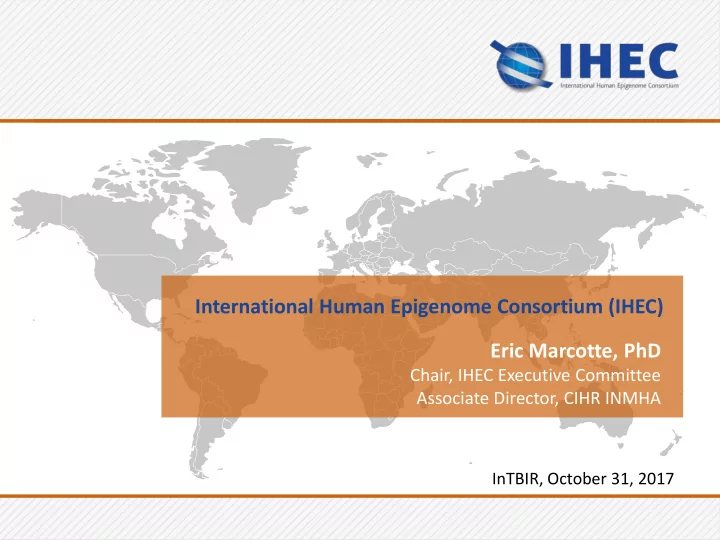

International Human Epigenome Consortium (IHEC) Eric Marcotte, PhD Chair, IHEC Executive Committee Associate Director, CIHR INMHA InTBIR, October 31, 2017
International Human Epigenome Consortium Generate reference maps of human epigenomes for key cellular states relevant to health and disease. Ambitious initial goal to complete 1000 epigenomes Rapid Data Release, Data Coordination, Archiving Environment Disease Aging Translation into Improved Human Health Mechanism Prevention Diagnosis Therapy
International Human Epigenome Consortium • Goals of the Consortium include: • Set minimum standards in epigenetic analysis (i.e., “gold standard”) • Maximize coverage of human cells/tissues • Reduce unnecessary duplication of tissues/cell types • Harmonize data collection methods and distribution to facilitate sharing and retrieval of results across countries • Initial focus on “healthy” human reference epigenomes, but expansion into disease areas over time > $175M USD Investment to Date
IHEC Membership (October 2011-2017) UK Funders Alliance * * * *
Key Challenge in November 2013 • Member data being produced more quickly than anticipated • As initially conceived, an IHEC Data Coordination Centre (DCC) would provide centralized access and analysis for all IHEC data, for all members • No central resources developed, so Canadian proposal to move to a common track hub standard among regional/country DCCs • Developed as a result of requiring two Canadian DCCs to coordinate their national activities • Data Integration Workgroup convened Jan 2014, with a working portal launched in July 2014
IHEC DATA PORTAL http://epigenomesportal.ca/ihec/
Including data from other studies Using IHEC Data Hubs, the Portal will enable external data integration • Data will be integrated in the Portal interface, and usable in external tools
Proposed integration of data access agreements O The epiMAP project O Access to controlled data: 7 Data Access Committees (DACs) in 8 jurisdictions Bioethics WG, Oct 2017
Proposed integration of data access agreements Hurdles O Legal O Socio-cultural O Administrative & procedural Bioethics WG, Oct 2017
Cell Paper Package • Coordinated collection released on November 17, 2016 • 41 publications in Cell , Cell Press and other high-impact journals ( Nature, Science, Genome Biology , etc.)
http://www.cell.com/consortium/ihec
Future of IHEC
Additional Slides
Why an epigenome initiative? • Epigenetics is the study of reversible (and potentially heritable) changes in gene activity and expression that are not dependent on alterations in DNA sequence – DNA methylation – Histone modifications – Transcription factor binding – Nucleosome position – Non-coding RNAs – Higher order chromatin structure
Consortium Structure
Consortium Structure Funding Agency A Funding Agency B Funding Agency C $ Funded Funded Funded projects projects projects
Recommend
More recommend